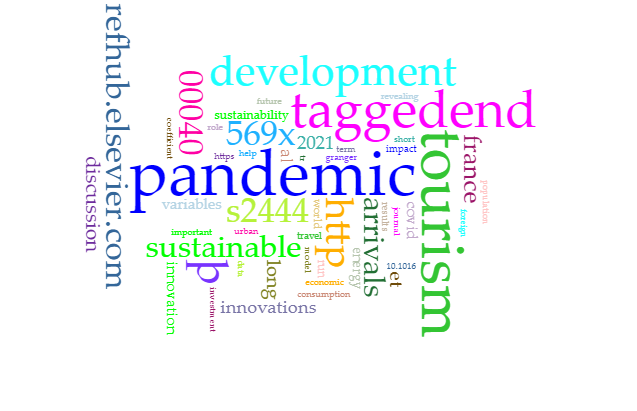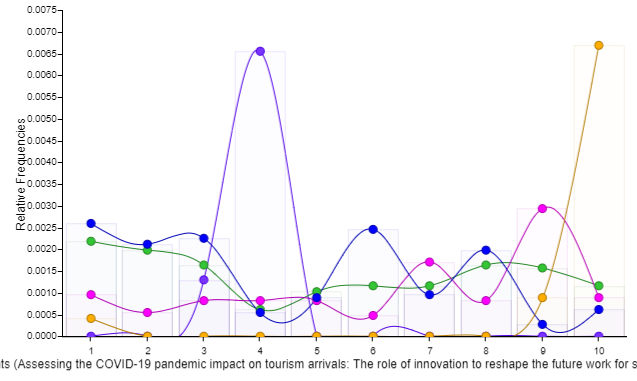I will present findings from two distinct articles and one book that have been subjected to rigorous distant reading analyses. Each article offers unique insights into the intersection of technology and the tourism industry, providing valuable perspectives on how technology can be leveraged efficiently to reshape the industry and enhance the overall experience of travelers.I will delve into these analyses and explore the implications they hold for the future of tourism. Let's dive into each analysis and uncover the transformative potential of technology in shaping the tourism landscape.
Technology in Tourism


Based on the most commonly used words in the distant reading analyses of the book "Technology in Tourism," the following key findings emerge:
The word "technology" signifies the central role of technological advancements in the tourism industry.
The term "tourism" highlights the focus of the book on the intersection of technology and the tourism sector.
The presence of "world" suggests a global perspective and the book's exploration of technology's impact on the industry at a worldwide scale.
"UNWTO" signifies the involvement of the United Nations World Tourism Organization, highlighting the book's consideration of international perspectives and initiatives.
The term "affiliate" implies the examination of affiliate marketing and its relevance to the tourism industry.
These findings indicate that the book explores how technology influences the tourism industry globally, with a focus on the role of organizations like UNWTO and the potential impact of affiliate marketing. By leveraging these insights, one can gain a deeper understanding of the implications of technology in reshaping the tourism industry and enhancing traveler experiences.
Impact of Airbnb Brand Personality
You can access the article here


The key findings from the analysis of the article on the "Impact of Airbnb Brand Personality" are as follows:
-
Trust: The presence of the word "trust" indicates the importance of trust-building in Airbnb's brand personality. This suggests that Airbnb's efforts to establish trust among users have been influential in shaping the brand's reputation.
-
Personality: The inclusion of the word "personality" highlights the role of Airbnb's distinct brand personality in creating an emotional connection with users. Airbnb's personality traits, such as being welcoming, authentic, and community-oriented, have contributed to building a strong brand image.
-
User Involvement: The mention of "involvement" signifies the significance of user participation in shaping Airbnb's brand experience. This suggests that Airbnb has successfully engaged users through features like reviews, user-generated content, and host-guest interactions.
-
Brand Differentiation: The analysis indicates that Airbnb's brand personality has played a significant role in differentiating the company from traditional hospitality providers. This suggests that Airbnb's unique brand personality has helped position the company as a disruptor in the industry.
COVID-19 Pandemic Impact on Tourism Arrivals
You can access the article here


Based on the distant reading analysis of the article on the "COVID-19 pandemic impact on tourism arrivals," the key findings are as follows:
1-Impact of the Pandemic on Tourism Arrivals: The analysis indicates that the COVID-19 pandemic has had a significant impact on tourism arrivals. The decline in tourist numbers, travel restrictions, and border closures have disrupted the tourism industry worldwide.
2-Recovery and Reopening Strategies: The presence of the word "end" suggests the need to address the impact of the pandemic and focus on recovery. Strategies such as vaccination campaigns, health protocols, and travel bubbles have been implemented by destinations and tourism stakeholders to safely reopen and revive tourism.
3-Adaptation to Changing Travel Trends: The mention of "tourism" highlights the need to adapt to changing travel trends and preferences in the post-pandemic era. The tourism industry has responded by promoting domestic tourism, emphasizing outdoor activities, implementing health and safety measures, and providing flexible booking and cancellation policies.
4-Role of Digital Technologies: The analysis indicates the relevance of digital technologies in mitigating the impact of the pandemic on tourism arrivals. The adoption of virtual experiences, online bookings, contactless payment systems, and digital health passports has facilitated safe and seamless travel experiences.
